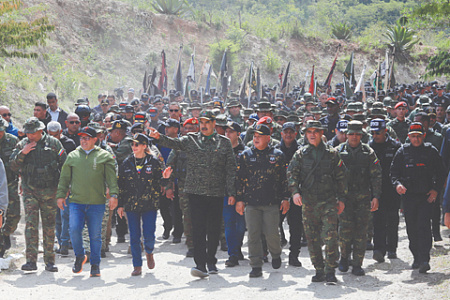
Tensions between the United States and Venezuela are spiraling into a full-blown information war after U.S. President Donald Trump announced a successful military strike against a vessel near the Venezuelan coast, a claim Caracas immediately dismissed as an AI-generated fabrication. The incident has intensified psychological pressure on both nations, raising the alarming possibility of the virtual conflict spilling over into a real-world military confrontation.
Speaking at the White House, President Trump declared that the U.S. military had destroyed a small boat carrying 11 alleged drug traffickers. He later amplified the announcement on social media, sharing a low-quality, black-and-white video purportedly showing a missile hitting the vessel. “Let this serve as a warning to anyone who even thinks about bringing drugs into the United States of America. BEWARE!” Trump posted, in a direct message to his adversaries.
In Caracas, the claim was met with outrage and skepticism. Venezuelan Minister for Information and Communication, Freddy Ñáñez, asserted that the video evidence was a deepfake. To support this, Ñáñez claimed his ministry had the clip analyzed by the Gemini AI, which allegedly confirmed it was likely generated. He further pointed to the ‘unrealistic’ appearance of the explosion and the water’s surface, comparing the video to an animation.
This dispute over a single video highlights a much deeper conflict in narratives. The Trump administration justifies its heightened military presence in the Caribbean as a necessary part of its counternarcotics campaign. Conversely, Caracas views the U.S. naval deployment as a thinly veiled pretext for either seizing Venezuela’s vast oil reserves or orchestrating regime change. In response, President Nicolás Maduro has signed a decree to reinforce the nation’s borders.
While Venezuelan rhetoric may contain elements of populism, the theme of regime change is not unfounded. Washington has been actively escalating pressure, recently doubling the reward for Maduro’s capture to $50 million. The U.S. also accuses the Venezuelan political elite of running a drug-trafficking organization known as the ‘Cartel of the Suns,’ though its existence remains unproven and appears to serve as a justification for targeting the president.
The U.S. actions have drawn condemnation from key leftist leaders in Latin America, including Colombian President Gustavo Petro and Mexican President Claudia Sheinbaum. Notably, Mexico recently rejected a U.S. offer to deploy American forces to help combat its own drug cartels, signaling regional resistance to U.S. military intervention.
The official U.S. rationale of fighting drug trafficking appears increasingly tenuous, as analysts note that Venezuela is not a primary route for narcotics entering the United States. A more plausible motive for the military posturing is likely to counter Caracas’s close ties with China and its support for Russia, with the White House hoping that saber-rattling will force concessions.
However, meaningful dialogue remains nearly impossible. The U.S. still does not recognize Maduro as the legitimate president following the disputed 2019 elections—a policy that was also in place during Trump’s previous term. As this information war intensifies, the psychological strain on the armed forces of both countries grows, dangerously increasing the risk that a miscalculation could ignite a real war that neither side can afford.
